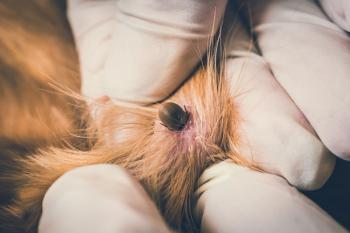“Cats are a potential gold mine for practices,” Dr. Adolph said, “but we need to explain to owners that cats do need routine veterinary care and protection against parasites like heartworm. Talking to clients about their feline pets during a canine visit is the perfect opportunity to explain what’s needed in terms of care.”
Feline heartworm prevalence
“With rare exception in the U.S., when there are heartworm data on both dogs and cats, prevalence in cats is higher,” said Dr. Adolph.
In hyper-endemic areas like Mississippi, where heartworm infection rates in dogs are through the roof, the prevalence in cats is about the same or lower. “But anywhere else you go, it is different,” he said, noting that in 2018 heartworm prevalence in dogs in New York was about 0.04%, but the rate in cats was about triple that.
There is some selection bias, Dr. Adolph noted, because most people are doing a good job with canine heartworm screening. But the cats that get a heartworm test are usually the ones that are displaying clinical signs.
“My hypothesis,” Dr. Adolph said, “is that if the profession would embrace routine heartworm testing in cats, the percentage would go down but the number of cases would absolutely go up because cats can and do get infected.”
Heartworm disease in cats
Although there are many similarities between heartworm disease in dogs and cats, there are major differences as well:
- Migrating larvae cause extensive damage in cats.
- Fewer adult worms are present in cats.
- Adult D. immitis has a shorter lifespan in cats.
- Cats are transiently microfilaremic.
- Heartworm detection is difficult in cats.
The feline heartworm disease phenomenon: a different entity
Heartworm in cats is similar in many ways to heart-worm in dogs—it is the same organism, vectored by mosquitos, and once the mosquito feeds, the larvae migrate through muscle tissue and, when they reach the adult stage, develop in the pulmonary artery.
But there are differences as well, and “testing in cats is not as easy as it is in dogs,” Dr. Adolph acknowledged.
Cats are atypical hosts for heartworms, and most worms in cats do not survive to the adult stage. In addition, cats have a more robust immune response to the presence of heartworms than dogs. “If the worms make it through the chest to the pulmonary artery—and we’re talking about only a few worms—that makes it harder to detect,” Dr. Adolph said.
But why test cats anyway?
“I have heard veterinarians say they do not test cats for heartworm, because if the test result is positive, they can’t do anything about it in terms of treatment,” Dr. Adolph said. But this logic, in his mind, is erroneous. “You absolutely can manage heartworm disease in cats, but you can only manage it if you know they have it. And you can only know they have it if you are screening for it.”





